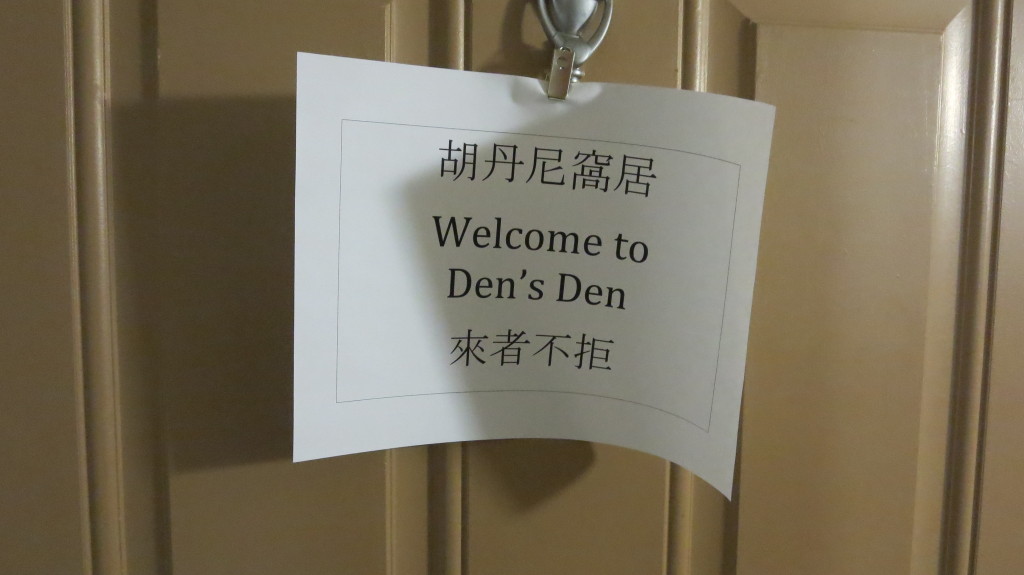Author: Den Hoopingarner
Determining Nationality
U.S. embassies represent the US government to their host country governments. The ambassador is the personal representative of the President of the United States to the foreign government. There certainly is some amount of representational activities that embassies participate in. The stereotypical cocktail party where people dress in tuxedos and hobnob with leaders of foreign governments.
That certainly happens in the diplomatic world, but I am not going to be part of it. At least, not for several years. I am going to be a consular officer for two years at least. No striped pants and platters of cookies for me. I am going to do blue-collar diplomacy. I am going to earn my paycheck through seriously hard work.
Most of the people who work in embassies spend their days providing services to U.S. citizens and to people who want to travel to the United States. That is what I am learning about now. I am in a six week course during which I learn how to help Americans who have gotten into trouble overseas, and to do something called “adjudicate” a visa application.
The American Citizen Services portion of this concert at work is very interesting. I am learning a lot about U.S. law regarding citizenship and nationality. For example, there is a common perception that if your parent was a US citizen, that you automatically are a U.S. citizen by birth. While this is true in certain circumstances, it is not always true. The law is quite complex. Part of our job is to apply the citizenship laws of the United States went we determined that child who was born abroad acquired citizenship at birth.
For example, if a woman who was born in the United States gives birth to a child outside the United States, her child is that U.S. citizen automatically. But what about a woman who is not a U.S. citizen, but who is married to a U.S. citizen and gives birth outside the United States? Is her child U.S. citizen by birth? The answer, but the answer to most questions regarding the law, is: “it depends.” The truth is that U.S. citizenship is not as simple as a lot of people assume. The law is complicated, and so the process to determine if someone is a U.S. citizen is complicated as well.
We spent over a week learning about the various conditions under which a child born abroad acquires or doesn’t acquire U.S. citizenship. Reflecting back on my own life, in retrospect, I am really glad that my children were born in the United States. Otherwise, because their mother was not a U.S. citizen when they were born, I would have had to jump through some hoops in order to ensure that our kids were U.S. citizens. I know now that because they were born after 1986, that I am a U.S. citizen, and that I lived in the United States for five years, two years of which were after my 14th birthday, that my children, even if born abroad, would be U.S. citizens by birth. However, we would have had to establish those facts with the U.S. Embassy before they could be issued a Consular Record of Birth Abroad (CRBA, pronounced “criba”), which would be evidence that they were U.S. citizens at birth.
I was going to write about immigrant visas, but after all of that information about nationality, my brain is tired, and after reading all of that, yours probably is, too. More later.
To “have “a language
The foreign service has been a cross-cultural experience for me in many ways. I am interacting with people from many different backgrounds: military, government, and private sector. I had expected that, and I enjoy working and interacting with my new colleagues. But one culture that I had expected to be familiar has instead turned out to be another cross-cultural experience: the language departments.
In the academic area that I come from, we talk about language acquisition and language proficiency. A theoretical term for classroom foreign-language learning is “instructed language acquisition.” At the Foreign Service Institute, it is quite different. We have many language departments, teaching many world languages. And overall, they do a really good job. The terminology, though, is quite different. So are the opinions and assumptions of the students in the language programs.
The most commonly used verb to describe language proficiency is “have.” In the foreign service, one does not “speak” the language, one “has” a language. We also use the word “train” instead of “learn”. We are in “language training,” or we don’t have to go to language training, because we already “have” the language.
One of the aspects of the foreign service that attracted me to the job was the fact that diplomats are expected, even required, to have foreign language proficiency, to be able to do complex tasks in foreign languages. We are expected to conduct interviews with the intention of not only extracting information, but also detecting fraud. We are expected to participate in meetings, and not only convey information, but also to grasp underlying or hidden meanings from our interlocutors. These tasks require high levels of language proficiency.
The standards are high, and the service invests a lot in language training. It is not uncommon for a diplomat to spend 10 months in intensive language training, during which several hours a day are spent in the classroom, the language lab, and in doing homework after class. Several of my classmates are in this language training right now. The length of the training depends on the difficulty of the language. But generally speaking, when learning a new language, we can expect to spend between six and 12 months just to get to working proficiency level.
Compared to the academic world, of course, this is incredibly fast. It’s not uncommon for someone to leave the university with a four year degree in a language, and still not have professional working capacity in that language. However, the situations are really quite different. University students spend one hour a day in the language classroom, in addition to all of the other academic classes that they take. In our case, learning a language is our full-time job. It’s all we are expected to do, and we do a lot of work to get there in a short period of time.
But that leads to the next cultural difference with regards to language. In my academic career, I rarely thought about language attrition. The understanding was that if you had language proficiency, you would have it forever. Of course, there are cases, such as immigrants who become immersed in a new language and lose aspects of their first language. But it is almost heresy in academia to state that someone who had language proficiency would somehow lose it. This was implicit in academic policies such as language proficiency tests that did not expire.
In the foreign service, the assumption is that if you have not used the language for a period of time, that you will need a “top off” course to brush up your language skills. If you take a language test to prove proficiency, your score has a five year time limit. The assumption here is that language ability, like any other skill, has to be used actively, or it will decay.
One area of commonality is how language departments communicate to students the difficulty of learning a language. Language learning strategies is also an area that can use improvement. I don’t know very much about the professional training background of the instructors, but it seems that the students have not been instructed in strategies to help them learn the language, other than “work hard”. To be honest, academia needs to improve in this area as well. We know a lot about language acquisition, especially second-language acquisition, but we have not done a very good job in communicating strategies or suggestions to language learners on how they can best make use of classroom time, interaction, and leverage their first language ability to learn a second.
I haven’t been in the foreign service long enough to make any judgment as to which position on language proficiency, language attrition, and language acquisition that I think is more accurate. But it has been interesting observing the cultural differences.
Another weird dream
Last night, I dreamt that There were three polar bears in my apartment, a mama and two cubs. The polar bears had Yellow Fever, which they had contracted from eating a diseased goat, the carcass of which was also in my apartment.
I had to be careful when I was disposing of the goat carcass, because of all of the zombies that were wandering in the hall.
Delicious dinner
This was a yummy and easy dinner. Yes, those are lentils in there, and yes, they’re both delicious and fun.
Here’s the recipe. I give it two thumbs up!
http://allrecipes.com/recipe/make-ahead-vegetarian-moroccan-stew/
I cut the recipe in half, and still wound up with about six quarts of stew. Guess what I’m having for dinner every day this month?
On to the next phase
Last Friday, our initial orientation class ended. There was a ceremony at the State Department main building, where we ceremoniously took the oath of office again. It was a lot more glamorous than our initial swearing in, which took place on the very first day that we reported for duty.
Why did we have to get sworn in twice? Well, we didn’t. It was necessary that we get sworn in on the very first day, because according to the Constitution, we could not officially be employees of the government until we took the oath. In other words, we could not get paid until we took the oath. It made a lot more sense for us to get sworn in right away. Completing the orientation training program was a milestone, so it also made sense to have a ceremony marking the occasion. That’s why we took the oath a second time.
Incidentally, the oath that we took is the same one that the President and members of the military take. It is constitutionally required, so the oath is largely the same for every federal government employee.
To be perfectly honest, the ceremony was really more of a photo op than anything else. Still, it was a lot of fun, the venue was very nice, and I’m glad that we did it.
From now on, the 87 people in my cohort are going in different directions. Some people are going to posts that have language requirements, and they don’t yet speak the languages. They will begin language training on Monday. The length of their language training depends on the difficulty of the language. Some will be in language training for six months, some 10 months, some people will be in training for 11 months. While they are in language training, their job is to learn language. They will be in class for six hours a day, plus homework. Very intensive language training. The requirement is that they will be able to conduct business in the language when they arrive at post. Gone are the days that we demanded everybody speak English, and relied on interpreters to help us interact with the host country government. Modern American diplomats conduct diplomacy in the language of the country where they are posted. This is a very very very good policy, in my opinion.
A few people are going to posts in English speaking countries. They obviously do not need language training. Several other people, myself included, are going to posts where we already speak the language. Since we do not need language training, we will begin the next phase of training. This phase will train us to be consular officers. To be honest, I am not yet sure what this training will entail. I know that it is a six-week program, so there must be a lot to learn. Beyond that, I am not at all sure I know what to expect. As usual, I will have to be flexible, and expect the unexpected.
This has been a very interesting adventure so far. There is much more to come, I’m sure.
FAQs about my post to Shenyang China
When will you leave?
Late in April, after I complete some specific training in Washington, DC.
Will you get to visit home before you leave?
Probably not.
How long will you be there?
The tour is two years. So I will be there until about April 2016.
What about your family?
We still have one son in high school. My wife will stay with him in Michigan until he graduates. Then she will accompany me.
Will you be able to come home and visit?
I can take vacation time and visit home. I hope to be able to return home in June 2015 to attend our younger son’s high school graduation.
Will your family visit you there?
I hope so! I miss them like crazy, and I’ve only been separated from them for a five weeks.
What will you do there?
I will be a consular officer. A lot of the time, I will help people get visas to come to the U.S. for tourism, business, and study. I will also provide services to U.S. citizens in the area who need help.
Did you want to be posted there?
Believe it or not, yes. There were dozens of places on the “bid list,” in many different countries. This one was my top choice.
Why did you want to go there?
Many reasons. First, I wanted a Chinese-speaking post, a place where I could improve my Chinese language skills. Second, I wanted a smaller post. At a small post, I will get to know people better, and I may be able to do a wider variety of things. Third, I did not want to be in a big city. Actually, Shenyang is a big city by American standards – over 6 million people live there. But I specifically didn’t want to be posted in a mega-city like Beijing or Shanghai. Finally, I am interested in the history of the area, and I hope to visit some of the historical sites in the area.
What will be next?
There is no long-term plan. Trying to plan beyond a year or so is like trying to shoot a moving target. All Foreign Service Officers move around from one post to another, so the personnel situation at the posts is always changing. In about a year, I will be able to see what is (scheduled to be) available, and choose my next post at that time.
More about my post
My first “tour” will be to Shenyang, China.
First some basics. Where is China? Here’s a globe. The green part is China.
Where is Shenyang? It’s in the north. Waaaaay up north. I circled it in red on this map. It isn’t the most northern part of China, but it’s pretty far up north. Farther north than most of North Korea.
And it gets cold there. Very very cold.
Next post I will answer some FAQs.









